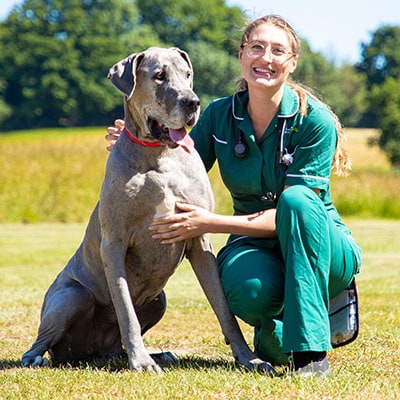 The day-to-day job of a veterinary nurse will vary but responsibilities may include:
The day-to-day job of a veterinary nurse will vary but responsibilities may include:
- preparing patients for surgical procedures
- providing support to animals and their owners before and after operations
- assisting in the operating theatre as a scrubbed-in veterinary nurse
- carrying out veterinary nurse consultations
- administering medications and fluid therapy to patients
- observing and recording patients' vital signs (temperature, pulse, respiration and pain)
- applying bandages to wounds and fractures
- educating animal owners on nutrition and preventative care and providing basic behavioural advice
- assisting during emergency procedures
- carrying out a range of diagnostic tests in the practice laboratory (e.g. blood or urine samples)
- taking radiographs
- dispensing medication and demonstrating to owners how to use them
- supporting and managing teams.
How do I become a veterinary nurse?
There are two routes to becoming qualified as a Registered Veterinary Nurse (RVN); either through vocational (college) training or via a higher education (university degree) qualification. Both routes lead to registration as a veterinary nurse with the Royal College of Veterinary Surgeons (RCVS).
Vocational
Those who prefer to complete on-the-job training may choose to go to college and work within practice whilst they complete their qualification. The Level 3 Veterinary Nursing diploma can either be completed through day release, where you attend college one day a week alongside work. Or it can be completed as a block release where you spend a period of time learning the theory and then blocks of time working within practice. This route is also available as an apprenticeship, which gives you the opportunity to be paid whilst you study and have your course fees funded.
If you're interested in the apprenticeship route, often the first step on this pathway is to look for a position as a Patient Care Assistant (PCA) where you can gain experience within a veterinary practice. These positions are offered within Linnaeus practices across the UK; find out more here. A PCA position may lead to a paid apprenticeship within that practice to complete your training as an student veterinary nurse and gain your qualification as an RVN.
Higher education (university degree)
The other route is the degree option. This is where you attend university, gain a degree and your Registered Veterinary Nursing qualification. You will spend periods of time learning the theory of veterinary nursing at university and then attend blocks of clinical placement within a veterinary practice. This option offers you the opportunity to experience university life and brings the potential to be taught by world-leading veterinary clinicians. Some universities run the veterinary nursing course alongside another discipline, such as companion animal behaviour or rehabilitation, providing you with another area of knowledge and opportunities to develop further qualifications within that additional area. You can explore the various courses by checking out the UCAS website.
Do I need to work in a veterinary practice?
Whichever route you choose, part of the training to become an RVN involves a minimum number of hours working in a veterinary practice in order to become competent in the RCVS Day One Skills (further information here). The veterinary practice that you train in must be an accredited RCVS Training Practice.
Linnaeus is an employer with many veterinary practices in the United Kingdom and the Republic of Ireland. Many of these practices will be supporting Student Veterinary Nurses in their career. Student veterinary nurse employment or placement can be challenging to find due to many people wishing to pursue this career. It may be easier to apply and work as a PCA at first in a veterinary practice in order to gain valuable skills and demonstrate your commitment to becoming an SVN.
If you are looking for employment or a placement then please contact your local practice, with your CV and covering letter, to ask if they have a vacancy now or in the future.
If you would like to know if your local practice is an accredited RCVS Training Practice you can find out here.
If you would like to search for a vacancy within one of our practices, you can do so here.
Thank you so much for you interest in becoming a Student Veterinary Nurse within a Linnaeus practice.
It’s great to know we have the next generation of Registered Veterinary Nurses in the pipeline.